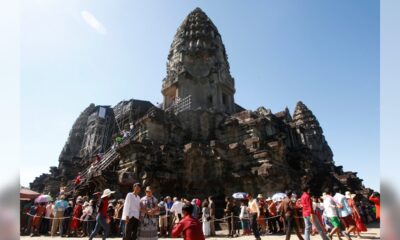Politics
Trump will be first ex-president on criminal trial. Here's what to know about the hush money case
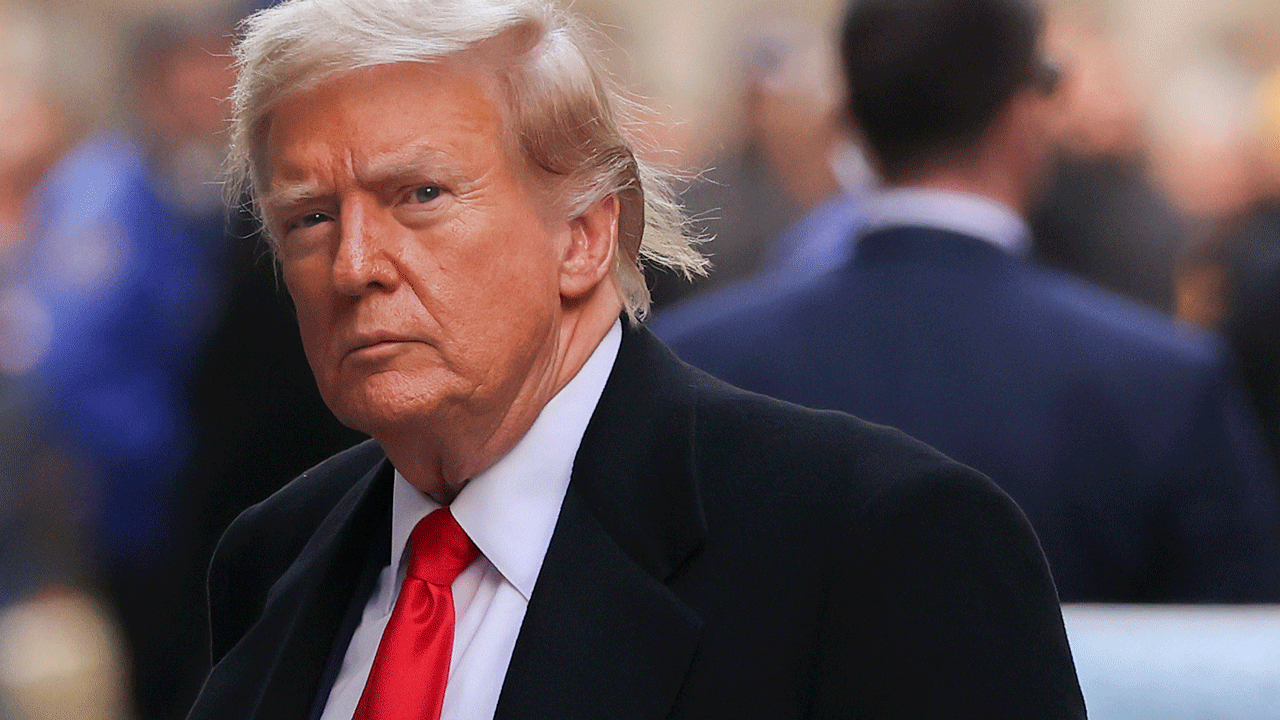
- When Donald Trump’s hush money case opens on Monday, he will become the first former president to stand trial on criminal charges.
- Trump, while juggling his presidential campaign, will defend himself against charges that involve a scheme to bury allegations of marital infidelity.
- He is being charged with 34 felony counts of falsifying business records — a charge that carries up to 4 years in prison.
NEW YORK (AP) — Donald Trump will make history as the first former president to stand trial on criminal charges when his hush money case opens Monday with jury selection.
The case will force the presumptive Republican presidential nominee to juggle campaigning with sitting in a Manhattan courtroom for weeks to defend himself against charges involving a scheme to bury allegations of marital infidelity that arose during his first White House campaign in 2016.
TRUMP REQUEST TO DELAY HUSH-MONEY TRIAL DENIED FOR THIRD TIME
It carries enormous political ramifications as potentially the only one of four criminal cases against Trump that could reach a verdict before voters decide in November whether to send him back to the White House.
Here’s what to know about the hush money case and the charges against Trump:
WHAT’S THIS CASE ABOUT?
The former president is accused of falsifying internal Trump Organization records as part of a scheme to bury damaging stories that he feared could hurt his 2016 campaign, particularly as Trump’s reputation was suffering at the time from comments he had made about women.
The allegations focus on payoffs to two women, porn actor Stormy Daniels and Playboy model Karen McDougal, who said they had extramarital sexual encounters with Trump years earlier, as well as to a Trump Tower doorman who claimed to have a story about a child he alleged Trump had out of wedlock. Trump says none of these supposed sexual encounters occurred.
Former President Donald Trump arrives for a press conference at Manhattan criminal court, March 25, 2024, in New York. Trump will make history as the first former president to stand trial on criminal charges when his hush money case opens with jury selection. The case will force the presumptive Republican presidential nominee to juggle campaigning with sitting in a Manhattan courtroom for weeks to defend himself against charges involving a scheme to bury allegations of marital infidelity that arose during his first White House campaign in 2016. (AP Photo/Yuki Iwamura)
Trump’s former lawyer and fixer, Michael Cohen, paid Daniels $130,000 and arranged for the publisher of the National Enquirer supermarket tabloid to pay McDougal $150,000 in a journalistically dubious practice known as “catch-and-kill” in which a publication pays for exclusive rights to someone’s story with no intention of publishing it, either as a favor to a celebrity subject or to gain leverage over the person.
Prosecutors say Trump’s company reimbursed Cohen and paid him bonuses and extra payments, all of which were falsely logged in Trump Organization records as legal expenses. Cohen has separately pleaded guilty to violating federal campaign finance law in connection with the payments.
WHAT ARE THE CHARGES?
Trump is charged with 34 felony counts of falsifying business records. The charge carries up to four years in prison, though whether he will spend time behind bars if convicted would ultimately be up to the judge.
The counts are linked to a series of checks written to Cohen to reimburse him for his role in paying off Daniels. Those payments, made over 12 months, were recorded as legal expenses in various internal company records.
To win on the felony charge, prosecutors must show that Trump not only falsified or caused business records to be entered falsely — which would be a misdemeanor — but that he did so with intent to commit or conceal a second crime. Manhattan District Attorney Alvin Bragg’s office has said that Trump was trying to conceal violations of federal campaign finance laws — an unusual legal strategy some experts argue could backfire.
HOW WILL JURY SELECTION WORK?
The process to choose 12 jurors, plus six alternates, will begin with Judge Juan M. Merchan bringing scores of people into his courtroom to begin weeding out people for potential biases or other reasons they cannot serve. The judge has said he will excuse anyone who indicates by a show of hands that they can’t serve or can’t be fair and impartial before calling groups of those who remain into the jury box to answer 42 questions. Potential jurors will be known only by number, as the judge has ordered their names to be kept secret from everyone except prosecutors, Trump and their legal teams.
Among the questions potential jurors will be asked: Whether they follow the former president on social media, have ever worked for a Trump organization and have ever attended a Trump rally — or anti-Trump organizations or rallies and whether potential jurors are supporters or followers of far-right groups, such as the Proud Boys and Oath Keepers, whose members were among the pro-Trump mob that stormed the U.S. Capitol on Jan. 6, 2021, or of the far-left-leaning collective known as antifa, which resists fascists and neo-Nazis, especially at demonstrations.
WHO’S EXPECTED TO TESTIFY?
Cohen, a Trump loyalist turned critic, is expected to be a key prosecution witness, as he was the one who orchestrated the payoffs. Before testifying in front of the grand jury that brought the indictment last year, Cohen said his goal was “to tell the truth” and insisted he is not seeking revenge but said Trump “needs to be held accountable for his dirty deeds.” Cohen served prison time after pleading guilty in 2018 to federal charges, including campaign finance violations, for arranging the payouts to Daniels and McDougal.
Other expected witnesses include Daniels, whose real name is Stephanie Clifford. Daniels alleges that she had a sexual encounter with Trump in 2006 that she didn’t want, but didn’t say no to. Trump says it never happened.
WHAT WILL TRUMP’S DEFENSE BE?
Trump has denied any wrongdoing and has slammed the case as an effort to hurt his 2024 presidential campaign. Trump has acknowledged reimbursing Cohen for the payment and that it was designed to stop Daniels from going public about the alleged encounter. But Trump said in 2018 it had nothing to do with the campaign.
Trump’s lawyers will likely attack the case by trying to undermine the credibility of prosecution witnesses like Cohen and Daniels. Trump has described the two as liars, testing the limits of a gag order that the judge imposed. It seeks to curtail the president’s inflammatory rhetoric about the case. Trump’s lawyers are expected to paint Cohen as a con man and point to his conviction on multiple federal crimes as well as his disbarment to try to persuade jurors that he can’t be believed.
Trump recently posted on social media a picture of a 2018 written statement from Daniels, in which she denied they had a sexual relationship. Not long after, Daniels recanted the statement and said that a sexual encounter had occurred. She said her denials were due to a non-disclosure agreement and that she signed the statement because the parties involved “made it sound like I had no choice.”
WHAT ABOUT TRUMP’S OTHER CASES?
Trump’s three other criminal cases have gotten bogged down in legal fights and appeals, which may mean jurors won’t hear about them before the November election.
The 2020 election interference case brought by special counsel Jack Smith remains on hold while Trump pursues his claim that he is immune from prosecution for actions he took while in the White House. The U.S. Supreme Court is scheduled to hear arguments on the matter in late April.
The other case brought by Smith accuses Trump of illegally retaining classified documents at his Mar-a-Lago estate. The trial had been scheduled to begin in May, but the judge heard arguments last month to set a new trial date and has yet to do so.
No trial date has been set in the Georgia case accusing Trump and his allies of conspiring to overturn his 2020 election loss in the state. Prosecutors have suggested a trial date of August, but defense attorneys are now urging an appeals court to consider whether Fulton County District Attorney Fani Willis should be disqualified from the prosecution over a romantic relationship she had with a former top prosecutor who recently withdrew from the case.
Trump has pleaded not guilty in all three cases and says he did nothing wrong.

Politics
Park Police union says officers ‘did everything they could’ during DC anti-Israel riot

Following the protests at Union Station by anti-Israel agitators defacing federal property in protest of Israeli Prime Minister Benjamin Netanyahu’s address to Congress, a Park Police union is pushing back against criticism that only a few arrests were made.
Thousands of Hamas-sympathizing agitators descended on Washington, D.C., Tuesday, at one point defacing federal monuments with phrases in support of the terrorist group responsible for the Oct. 7 attacks in Israel, saying, “Hamas is coming.”
Twenty-three people were arrested at the protests, but some have suggested that number should have been higher.
Sen. Marco Rubio, R-Fla., posted on X, “How many more times are they going to allow leftist degenerates who support terrorism and hate America to vandalize property and attack police? There should have been hundreds of arrests today in D.C. not just 23.”
HOUSE REPUBLICANS REPLACE AMERICAN FLAGS AT UNION STATION AFTER ANTI-ISRAEL PROTESTS
The Columbus Memorial Fountain at Union Station during an anti-Israel protest on the day Israeli Prime Minister Benjamin Netanyahu addressed a joint meeting of Congress on Capitol Hill in Washington July 24, 2024. (Reuters/Seth Herald)
But the U.S. Park Police Labor Committee is pushing back.
“Our officers on the ground did everything they could to protect life and property. In fact, despite having only 29 officers available to mitigate damage — 29! — with no additional help from the Department of the Interior, we processed several arrests for charges ranging from assault on a police officer to destruction of government property,” Kenneth Spencer, chairman of the United States Park Police Fraternal Order of Police, said in a statement.
“That’s why it’s so disheartening to hear some members of Congress and members of the media, many of whom describe themselves as ‘champions’ of law enforcement, suggesting that officers gave protesters a ‘pass’ or that insufficient arrests were made.
“Nothing could be further from the truth. Anyone who truly cares to understand the problem would see that our officer staffing crisis is at the root of our agency’s mission readiness. A small unit of 29 officers arrested 10 individuals while being assaulted by a mob of thousands. We simply did not have the staffing or resources to accomplish a mass arrest operation.”
SEE IT: THE MOST DRAMATIC PHOTOS FROM WEDNESDAY’S PRO-HAMAS WASHINGTON, D.C. PROTESTS
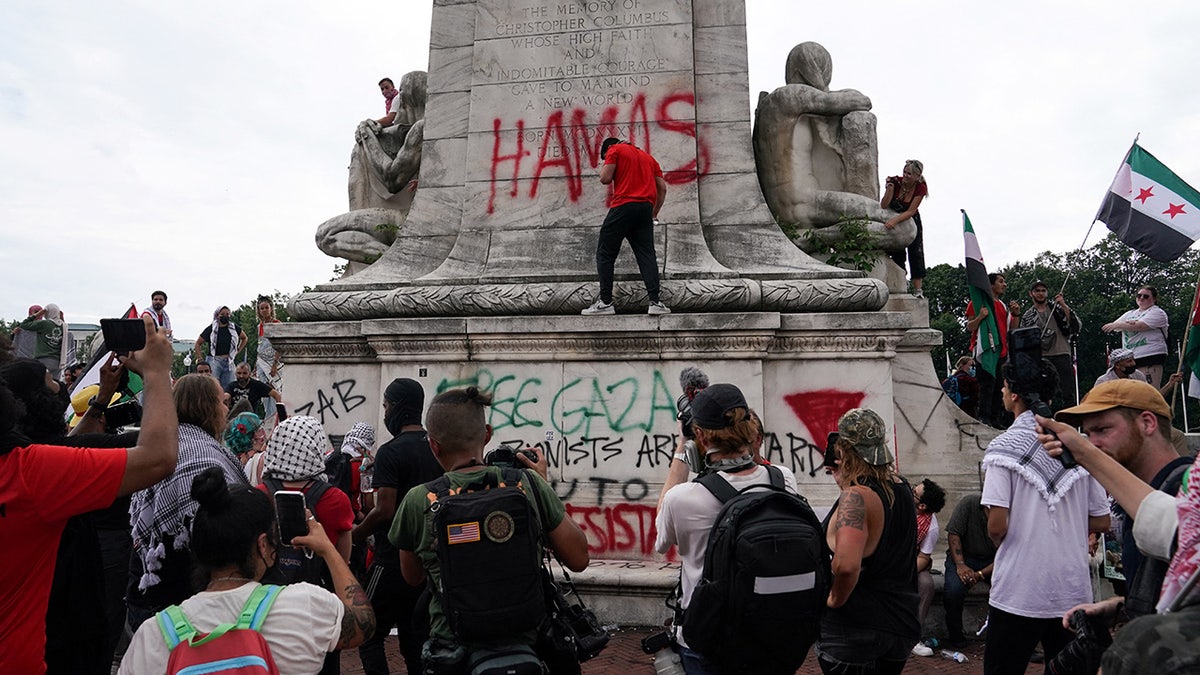
An anti-Israel demonstrator sprays graffiti on the Christopher Columbus Memorial Fountain at Union Station on the day of Israeli Prime Minister Benjamin Netanyahu’s address to a joint meeting of Congress on Capitol Hill in Washington July 24, 2024. (Reuters/Nathan Howard)
At least one demonstrator, whose face was covered, was spotted by Fox News carrying what appeared to be the flag of the terrorist group Hamas while others were heard shouting “Allahu Akbar.”
KAMALA HARRIS REACTS TO ANTI-ISRAEL RIOTS AT DC’S UNION STATION
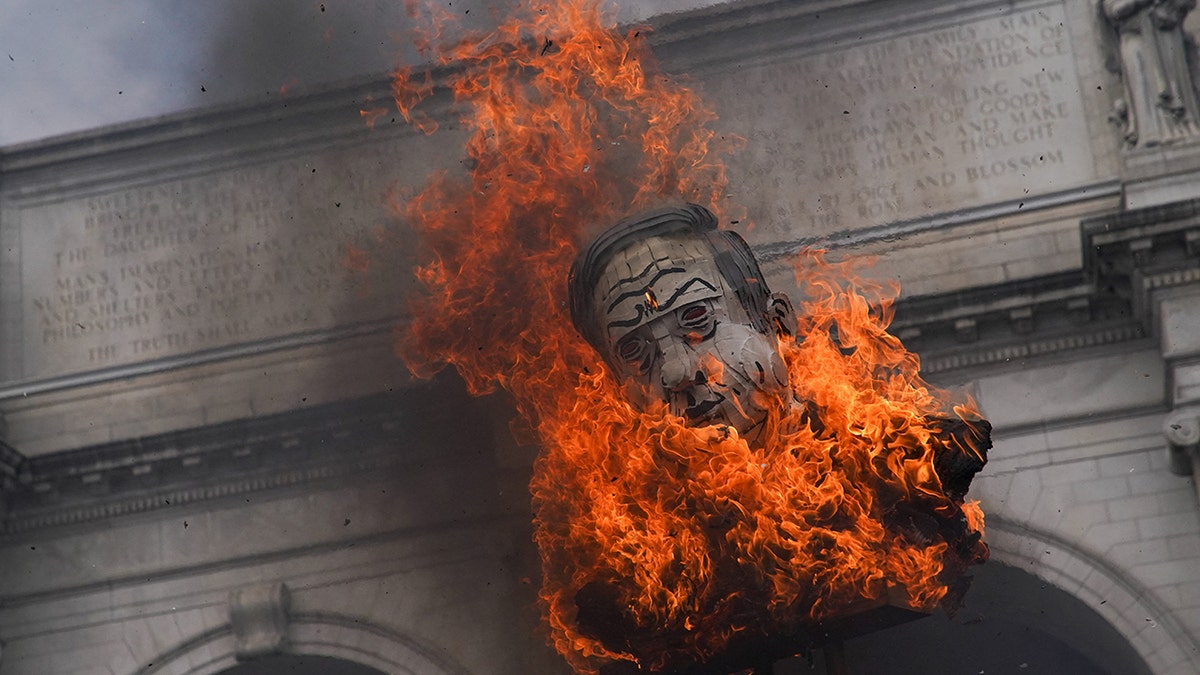
Anti-Israel demonstrators burn an effigy depicting Israeli Prime Minister Benjamin Netanyahu outside Union Station on the day of Netanyahu’s address to a joint meeting of Congress on Capitol Hill in Washington July 24, 2024. (Reuters/Nathan Howard)
The White House condemned the protests Wednesday evening, calling the chaos “disgraceful.”
“Identifying with evil terrorist organizations like Hamas, burning the American flag or forcibly removing the American flag and replacing it with another is disgraceful,” White House spokesperson Andrew Bates said in a comment to Fox News Digital Wednesday evening.
Politics
Ali: Kamala Harris has a campaign soundtrack: Beyoncé's 'Freedom'
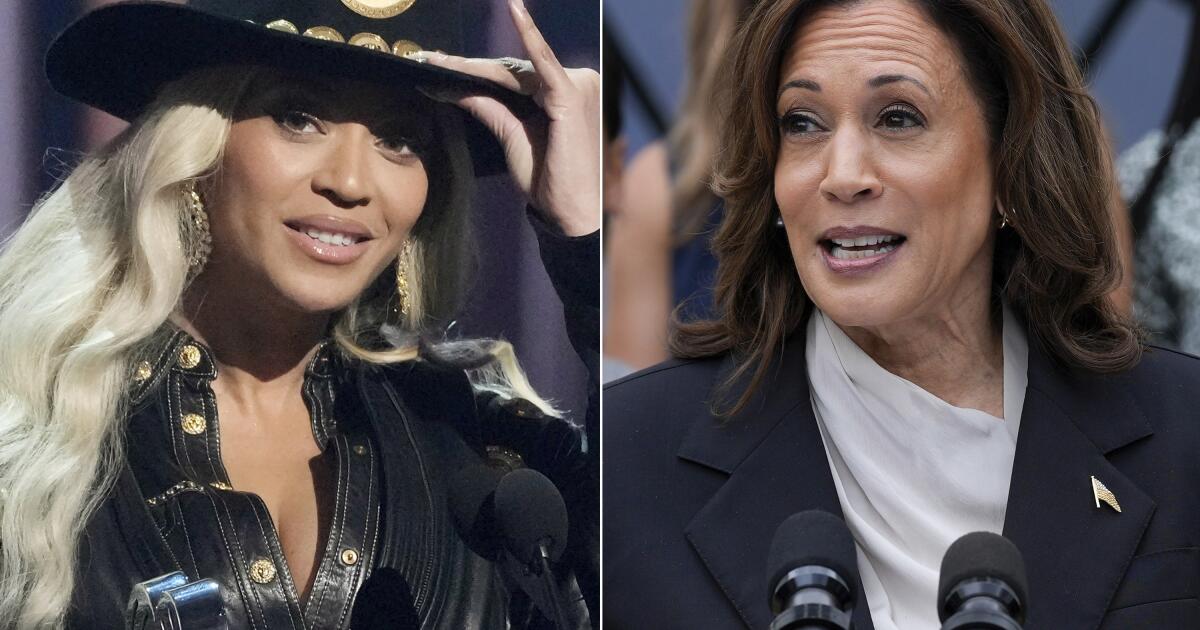
Vice President Kamala Harris’ bid for the presidency has a soundtrack: Beyoncé’s “Freedom.”
The leading Democratic presidential candidate took the stage in her first visit to her Wilmington, Del. campaign headquarters and again during her first campaign rally in Wisconsin as the song played.
Now the cathartic anthem graces Harris’ first campaign ad, in which she says: “There are some people who think that we should be a country of chaos, of fear, of hate. But us? We choose something different: We choose freedom.”
Pit that against the musical number her competitor chose for his grand entrance on Night 3 of the Republican National Conference. Donald Trump walked out to James Brown’s “It’s a Man’s, Man’s, Man’s World,” a tone-deaf choice for a former president found liable for sexual abuse, who’s bragged about sexually assaulting women, a married man who paid hush money to a porn star and a former president who rolled back women’s reproductive rights 50 years with the repeal of Roe vs. Wade.
Maybe the Godfather of Soul would have endorsed Trump’s usage of his song, but Brown would be breaking with decades’ worth of musicians who’ve decried GOP candidates playing their tracks at rallies and booster events. Adele, Rihanna, R.E.M., the Rolling Stones, Prince, Neil Young, Guns N’ Roses and Queen are among the many artists who’ve spoken out against Trump using their tunes for campaign purposes.
Heart bristled when the McCain-Palin campaign used “Barracuda.” Tom Petty insisted George W. Bush back away from “I Won’t Back Down.” Bruce Springsteen decried Ronald Reagan’s appropriation of “Born in the U.S.A.”
Beyoncé, however, gave Harris her blessing to use “Freedom,” a single from her 2016 blockbuster album “Lemonade.” The song, which features guest rapper Kendrick Lamar, is an explosive expression of empowerment. At the time of its release, it spoke to public outcry around police killings of unarmed Black men and women — Eric Garner, Tamar Rice, Freddie Gray — and protests that were largely fueled by the ire of younger generations.
Whether Beyoncé was singing about the tyranny of a cheating spouse or racial injustice (or both), the song became an anthem for a new, potentially potent block of the American electorate.
For the first time, Gen Z and millennials could now account for as many votes as baby boomers and their elders, groups that have made up a majority of the electorate for decades.
Folks under 40 have grown up with Beyoncé and her ubiquitous work. Think of Beyoncé like the Who for boomers — their work is everywhere (Republican Sen. Rand Paul played the band’s anti-war hit “Baba O’Riley” when he campaigned in 2015) — or Nirvana for Gen X, except no one cares what we think. Whatever, nevermind.
The Harris campaign’s smart choice of music coincides with a willingness to lean into a meme culture that shot up organically around the 59-year-old VP since President Biden announced Sunday that he was dropping out of the race.
Pop star Charli XCX showed her support for Harris when she tweeted “Kamala IS brat.” The British singer is referring to the TikTok and Twitter edits of Harris’ image superimposed to songs from Charli XCX’s hit album “Brat.” The avalanche of memes come from a video clip in which Harris talks about her mother’s response to the hubris of youth: “You think you just fell out of a coconut tree? You exist in the context of all in which you live and what came before you.”
Right-wing social media used the quote to deride Harris as inarticulate and a “word salad” master, but liberal swaths of Gen Z have since reworked the clip into emojis and memes that celebrate Harris’ nonconformist approach. She’s become a viral sensation, in a good way, unlike J.D. Vance’s damning “single cat lady” memes and a cringey internet joke about encounters with couches.
It’s rare that relevant talent will shill for a Republican candidate. Case in point: Trump’s pop culture ambassadors at this year’s RNC were Kid Rock, Kanye’s ex Amber Rose and former WWE wrestler Hulk Hogan, whose big moment was ripping his shirt off and screaming “Let Trump mania run wild!”
Harris chose to let freedom ring, and she has Queen Bey behind her.
Politics
Texas sues Biden administration over program giving birth control to teens without parents' knowledge

Texas officials are challenging a recent order from President Biden’s administration that would allow schools to distribute birth control to teenagers without parental consent.
Texas Attorney General Ken Paxton announced Thursday that his office is suing the Biden administration over their 2021 change to Title X guidelines banning parental consent requirements for birth control services.
“By attempting to force Texas healthcare providers to offer contraceptives to children without parental consent, the Biden Administration continues to prove they will do anything to implement their extremist agenda — even undermine the Constitution and violate the law,” Paxton said in a statement.
TRUMP SAYS HE ‘WILL NEVER ADVOCATE IMPOSING RESTRICTIONS ON BIRTH CONTROL’ OR OTHER CONTRACEPTIVES
A woman takes the next pill from a monthly pack of contraceptive pills. (Annette Riedl/picture alliance via Getty Images)
The Texas legal battle began in Dec. 2021 when US District Judge Matthew Kacsmaryk ruled that Title X — the federal program that provides free, confidential contraception to anyone regardless of age, income or immigration status — violates parental rights and violates state and federal laws.
The case was argued by former solicitor general of Texas Jonathan Mitchell, representing father Alex Deanda, who said he was “raising each of his daughters in accordance with Christian teaching on matters of sexuality, which requires unmarried children to practice abstinence and refrain from sexual intercourse until marriage.”
SCHUMER PLANS VOTE ON ‘CONSTITUTIONAL RIGHT TO CONTRACEPTION’ IN BID TO PROTECT SENATE DEMOCRAT MAJORITY
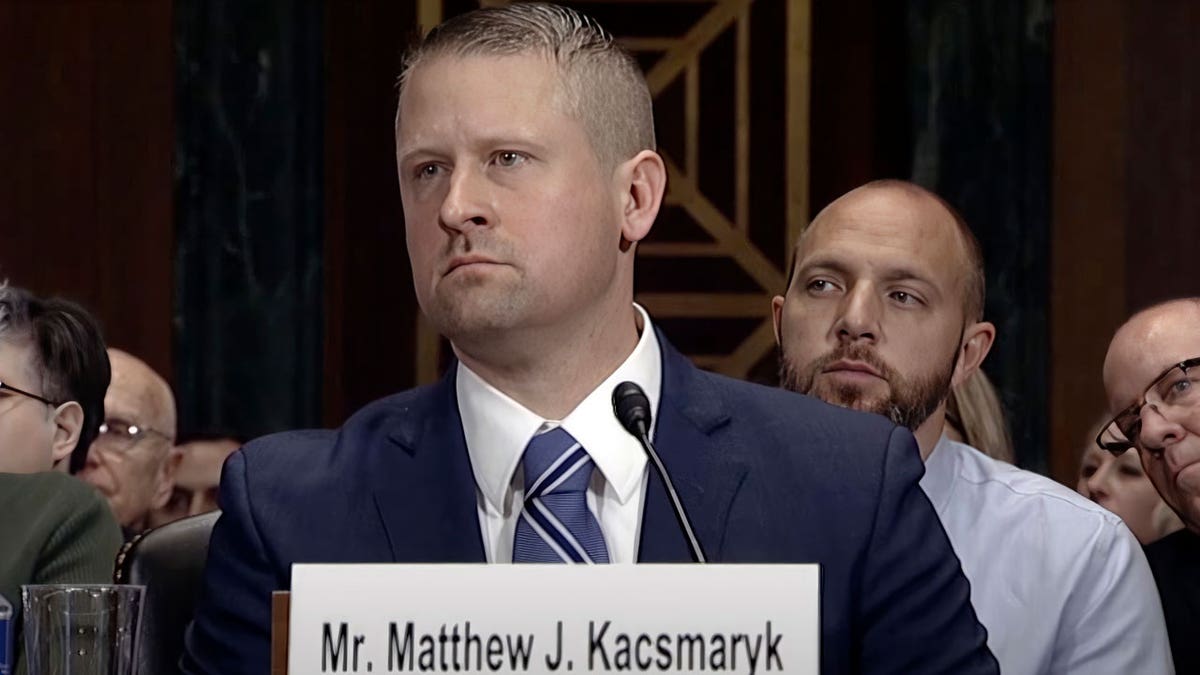
Kacsmaryk, a Trump appointee, previously ruled that parents must be informed when birth control is provided to their children under 18 years old. (Senate Judiciary Committee via AP)
In response, the federal government updated guidelines to state that Title X projects “may not require consent of parents or guardians for the provision of services to minors, nor can any Title X project staff notify a parent or guardian before or after a minor has requested and/or received Title X family planning services.”
Paxton is now seeking a permanent injunction on this rule, which he claims defies the findings of the federal court.
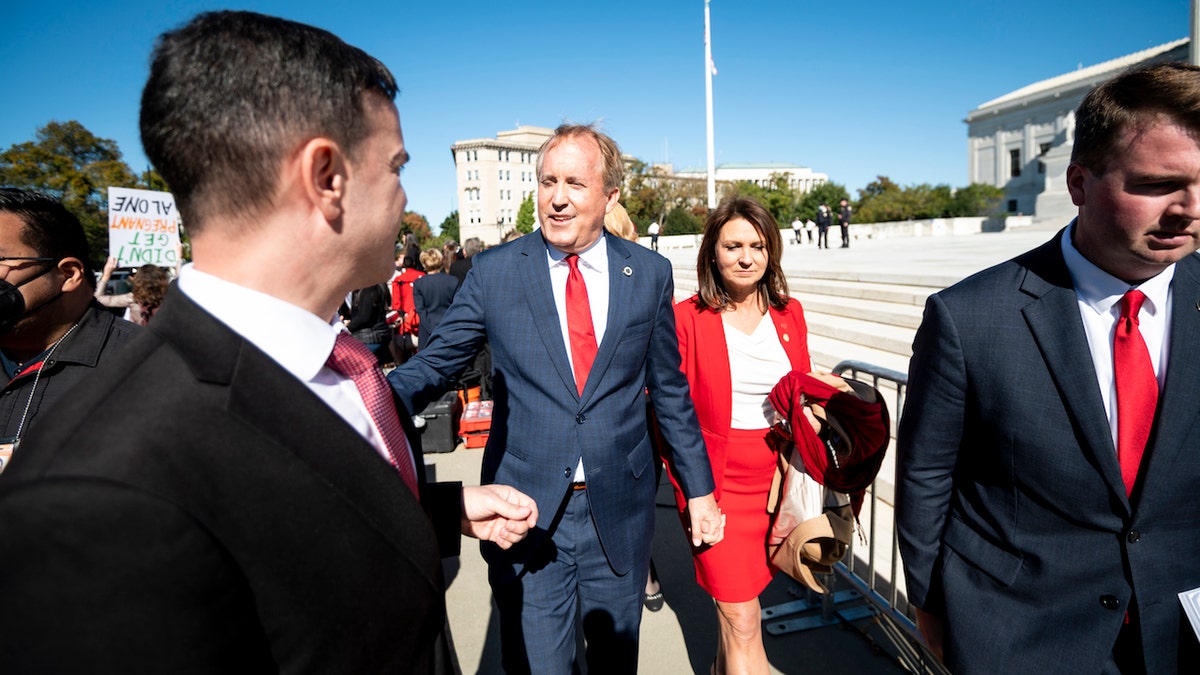
Paxton and his wife Angela are pictured outside the Supreme Court. (Bill Clark/CQ-Roll Call, Inc via Getty Images)
Paxton filed the lawsuit in a federal court in Amarillo. It will likely be heard by Kacsmaryk, the same judge who previously ruled parents must be informed of birth control provided to their children.
-

 World1 week ago
World1 week agoOne dead after car crashes into restaurant in Paris
-

 Midwest1 week ago
Midwest1 week agoMichigan rep posts video response to Stephen Colbert's joke about his RNC speech: 'Touché'
-

 News1 week ago
News1 week agoVideo: Young Republicans on Why Their Party Isn’t Reaching Gen Z (And What They Can Do About It)
-

 Movie Reviews1 week ago
Movie Reviews1 week agoMovie Review: A new generation drives into the storm in rousing ‘Twisters’
-

 News1 week ago
News1 week agoIn Milwaukee, Black Voters Struggle to Find a Home With Either Party
-

 Politics1 week ago
Politics1 week agoFox News Politics: The Call is Coming from Inside the House
-

 News1 week ago
News1 week agoVideo: J.D. Vance Accepts Vice-Presidential Nomination
-

 World1 week ago
World1 week agoTrump to take RNC stage for first speech since assassination attempt

